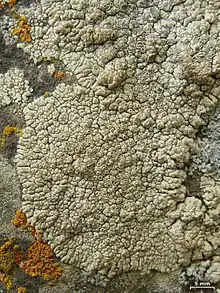Lobothallia alphoplaca
Lobothallia alphoplaca, the variable sunken disk lichen, is a creamy gray to brown,[2]: 307 placodioid areolate lichen that grows on rock in on rock and sometimes moss.[3] It prefers growing on siliceous rocks.[3] It is found in Europe, central Asia, and North America, where it grows in the southwestern deserts to central California.[3] The center has numerous crowded and deformed apothecia with rims of thallus-like tissue (lecanorine).[3] With dark reddish or grayish brown to black discs.[3] Lichen spot tests on the thallus and apothecia are C−, and KC−, with tests on the cortex K+ red, P+ orange, or K−, P− and on the medulla K+ red, and P+ orange.[3] It produces norstictic acid, constictic acid, or salazinic acid as secondary metabolites.[3]
| Lobothallia alphoplaca | |
|---|---|
 | |
| Scientific classification | |
| Domain: | Eukaryota |
| Kingdom: | Fungi |
| Division: | Ascomycota |
| Class: | Lecanoromycetes |
| Order: | Pertusariales |
| Family: | Megasporaceae |
| Genus: | Lobothallia |
| Species: | L. alphoplaca |
| Binomial name | |
| Lobothallia alphoplaca | |
| Synonyms[1] | |
References
- "Synonymy: Lobothallia alphoplaca (Wahlenb.) Hafellner". Species Fungorum. CAB International. Retrieved 2014-11-01.
- Field Guide to California Lichens, Stephen Sharnoff, Yale University Press, 2014, ISBN 978-0-300-19500-2
- Lichen Flora of the Greater Sonoran Desert Region. Vol 2, Nash, T.H., Ryan, B.D., Gries, C., Bugartz, F., (eds.) 2001,